Dispatches from campus
Selfless selfies Strategic Plan Margaret MacMillan to speak at Spring Reunion Elevator construction Herma Joel retires Trinity courses in Orthodox Christianity QE II Diamond Jubilee Scholarship program Rhodes Scholars Robertson Davies’ Book of Common Prayer From the Archives
Student-led “Selfless Selfies” raise $1,100 for Syrian refugees
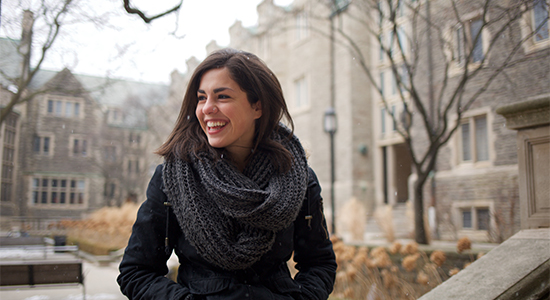 The Trinity Quad was the setting for two fun—and chilly—photo shoots in February. “My brother and I finally got our hands on a brand new DSLR camera that we had been dying to test out, and we thought to turn the occasion into a win-win situation for everyone with the creation of Selfless Selfies,” explains Max Levy ’18 (major in Ethics, Society and Law with minors in History and Cinema Studies). “Each person got their own unique, professional quality self-portrait in the Trinity Quad for a small donation, which then went to the charity Lifeline Syria to help fund a Syrian refugee family. And we got some experience testing out our new camera.”On February 17 and 19 Max and his twin brother, Lorne ’18 (double major in Ethics, Society & Law and History), sat at a table outside Strachan Hall with music blasting and signs promoting their cause. “The response was overwhelmingly positive,” says Levy. “Students, professors, and faculty members of all kinds opted in for a Selfless Selfie, putting aside any nervousness for a couple of minutes and letting loose while we took some candid shots. Many people gave more than the minimum $5 donation, and some even contributed $50 or more. After two days we raised over $1,100 dollars for Lifeline Syria, and ended up with some incredible shots that showcased the wide range of personalities here at Trinity College.”
The Trinity Quad was the setting for two fun—and chilly—photo shoots in February. “My brother and I finally got our hands on a brand new DSLR camera that we had been dying to test out, and we thought to turn the occasion into a win-win situation for everyone with the creation of Selfless Selfies,” explains Max Levy ’18 (major in Ethics, Society and Law with minors in History and Cinema Studies). “Each person got their own unique, professional quality self-portrait in the Trinity Quad for a small donation, which then went to the charity Lifeline Syria to help fund a Syrian refugee family. And we got some experience testing out our new camera.”On February 17 and 19 Max and his twin brother, Lorne ’18 (double major in Ethics, Society & Law and History), sat at a table outside Strachan Hall with music blasting and signs promoting their cause. “The response was overwhelmingly positive,” says Levy. “Students, professors, and faculty members of all kinds opted in for a Selfless Selfie, putting aside any nervousness for a couple of minutes and letting loose while we took some candid shots. Many people gave more than the minimum $5 donation, and some even contributed $50 or more. After two days we raised over $1,100 dollars for Lifeline Syria, and ended up with some incredible shots that showcased the wide range of personalities here at Trinity College.”
Trinity College Strategic Plan 2016: People, Program & Place
By Mayo Moran, Provost and Vice-Chancellor, Trinity CollegeTrinity College is first and foremost a community—a community built on a set of values that stress the importance of an outstanding education in a setting that values creativity and believes in contribution. The College’s enduring mission statement also expresses our focus on excellence in learning and contribution to the broader world: A small, distinctive college at the heart of a great university, Trinity offers an exceptional academic experience and fosters community, responsibility and leadership. The aspiration of Trinity is simple and long-standing—it is to be the very best.
The new strategic plan reflects the input from extensive consultations and builds upon the framework of the College’s last strategic plan in 2009.
Trinity’s strengths lie in our people, our program and our place. Focusing on these three key strategic pillars to enhance the student experience is at the heart of our ambitions for the College and the driving force behind the new plan.
Pillar 1: People
• Attract the Very Best Students • Strengthen Student Services • Foster a Vibrant Intellectual Community
Pillar 2: Program
• Offer Outstanding Academic Programs • Integrate Co-Curricular Programs
Pillar 3: Place
• Build for the Future
These three pillars will guide our efforts as we go forward in the next five years and beyond. We have already begun work in many of the priority areas, but we know that much more work is ahead of us to ensure that Trinity continues its tradition of excellence and leadership.
To learn about Trinity’s strategic directions and priorities, please view the Strategic Plan 2016 online at http://uoft.me/TCPlan. If you have questions or comments on the Strategic Plan, email provost@trinity.utoronto.ca or call 416-978-2689.
Margaret MacMillan to speak at Spring Reunion in honour of her 50th Trinity Reunion
Internationally acclaimed historian and author Margaret MacMillan ’66 will offer her insights into what history teaches us at the College’s annual Reunion reception and lunch on Saturday, May 27, in a talk titled, “Why History Matters.” Trinity’s Provost from 2002 to 2007, MacMillan’s contributions as a chronicler of the important and complex relationship between biography and history, individuals and their ideas and times have earned her numerous awards and honours, including the Order of Canada. As a member of the Class of ’66, this is a special Reunion for her: “My memory of the Class of ’66 was how lively and engaged we were as students,” she says. “I think we are bound to have a lively and engaged 50th reunion! There are so many great events planned. I’m looking forward to seeing my classmates as well as students from my time as Provost.”In addition to individual events being organized by class reps, Spring Reunion will feature the following not-to-be-missed events:
Saturday, May 27
11:30 a.m. *SOLD OUT*
Reunion Wine Reception and Lunch with remarks by Margaret MacMillan.
2:30 p.m. *SOLD OUT*
A guided ROMwalk tour of Trinity College led by volunteers from the Royal Ontario Museum. Enjoy the artistic treasures of Trinity College, including carvings, heraldic ornaments, and more.
5 p.m.
TrinX Cocktails in the Provost’s Lodge for graduates of the last decade (2006-2016). 6 p.m. The Annual Dinner Garden Party Hundreds of people attend this popular event each year. Strachan Hall will be filled to bursting with food and drink, and the Quad will offer a beautiful spot to catch up with friends! To register and learn more, visit springreunion.utoronto.ca
Archives and elevator construction progressing well
 Construction continues on Trinity’s soon-to-be-spectacular new archives. The lower-level space will also be fully accessible, thanks to the new elevator that is being built to connect the College’s basement, first and second floors. “The flooring is on its way, the display cases are on order, the elevator is taking shape,” says Sylvia Lassam, Trinity’s Rolph-Bell Archivist. “It’s starting to feel like we’re in the home stretch.” View photos of the construction at on.fb.me/1So64Q7.
Construction continues on Trinity’s soon-to-be-spectacular new archives. The lower-level space will also be fully accessible, thanks to the new elevator that is being built to connect the College’s basement, first and second floors. “The flooring is on its way, the display cases are on order, the elevator is taking shape,” says Sylvia Lassam, Trinity’s Rolph-Bell Archivist. “It’s starting to feel like we’re in the home stretch.” View photos of the construction at on.fb.me/1So64Q7.
Long-serving staff member Herma Joel retires
On February 26, Trinity staff, faculty and friends joined together to celebrate the career of Herma Joel, who retired from the Faculty of Arts after more than 34 years with the College.
Trinity now offering post-graduate courses in Orthodox Christianity
The College’s Divinity students can now take courses in Orthodox Christianity as part of their Masters of Divinity studies. The opportunity is the first of its kind in Canada, created for students seeking a Master’s-level degree in professional studies in preparation for ordination in an Orthodox or Eastern Christian church; other students who wish to include some knowledge of Orthodox tradition in their own course of studies; and adult learners seeking an understanding of Orthodox tradition on a non-credit basis.
The Orthodox Christianity stream is managed by the Orthodox School of Theology at Trinity College, which began in 2006 as the Orthodox and Eastern Christian Studies programme at Trinity College, offering 14 courses (15 credits) leading to a certificate or diploma or, with further credits, a Master of Theological Studies (MTS) degree. In 2015, the program was extended to include a Master of Divinity (MDiv) degree and the Orthodox School of Theology at Trinity College was created.
Trinity welcomes all Orthodox Christians, from both “Byzantine” and “Oriental” traditions, as well as Eastern Rite Catholics and Western Christians who are interested in the history, faith and life of the early church and the Christian East. “Orthodox historians and theologians have a lot to offer in terms of early church writers and history, and Anglicans have a long tradition of interest in Eastern Christianity—its icons, its spirituality and its authentic character,” says David Neelands, Trinity’s Dean of Divinity.
For more information, visit trinityorthodox.ca.
Queen Elizabeth II Diamond Jubilee Scholarship program
Trinity’s Faculty of Arts has issued a call for applications for students interested in international internships through this year’s Queen Elizabeth II Diamond Jubilee Scholarship program.
The program, which began in 2015, was created to honour the 60th Anniversary of Her Majesty Queen Elizabeth II’s ascension to the throne. It is a unique partnership of the Rideau Hall Foundation, the Community Foundations of Canada, and the Association of Universities and Colleges of Canada with financial support from the Government of Canada, provincial governments and the private sector.
It’s a “tremendous opportunity” for Trinity students, says Dean of Arts Michael Ratcliffe. “Trinity students have been telling us for years that they would welcome the opportunity to study abroad as part of their Trinity education,” says Ratcliffe. “The students who took part in it last year benefited on so many levels. We’re thrilled to be able to expand the offering to even more students this year.” The three-month internships span the globe and are offered for summer 2016 through two program streams: Establishing Right Relations: Advancing Development and Prosperity for Indigenous and Settler Populations in the Commonwealth; and Immunology as a Platform for Sustainable International Partnership.
Learn more and apply at uoft.me/ TCQEDJS.
TRINITY OF SCHOLARS
The College’s three newest winners of prestigious awards—two Rhodes and a Schwarzman Scholar—talk about their future plans
By Liz Allemang
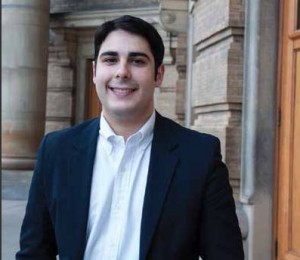
“I was in shock,” remembers Kaleem Hawa (’16; double major in International Relations and Human Biology), when he received the news that he had won the prestigious Rhodes Scholarship. “I knew I was shortlisted, but no one counts on winning because it is very competitive,” he says. “So you have your plan.” His was a post-graduation job lined up in Toronto, at McKinsey and Company, a global management consultancy.
Hawa, who attended Trinity as a BMO Loran Scholar, will have to change his “plan” as he gets ready to move across the pond. As will James Flynn, (’16; double major in Political Science and Economics), who is also Oxfordbound on a Rhodes Scholarship. Flynn intends to pursue an MPhil in economic and social history, and is particularly keen to research the impact of colonial history on Newfoundland.
“I would like to investigate the impact of British colonial policy on contemporary economic development in Newfoundland,” says Flynn, a Newfoundlander whose intention is to return eventually to his home province to give back to his community. Or, rather, keep giving back, having already founded Code NL, which seeks to improve computer programming education in Newfoundland and Labrador. This, paired with his achievements both extracurricular and academic—in addition to attending U of T on a Bank of Montreal University of Toronto National Scholarship, he was managing online editor and news editor of the Varsity, and a tutor with Project: Universal Minds—no doubt made him an ideal Rhodes candidate.
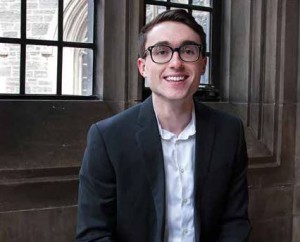
The same could be said for Hawa. While at Trinity he was at the helm of the Hart House Debates Committee and the U of T Liberals, Chair of Trinity’s student government in 2014-2015 and an undergraduate representative on U of T Provost Cheryl Regehr’s Mental Health Committee. His undergraduate degree, focused on new, emergent issues in national security, such as pandemics, is especially topical in the current global climate.
Hawa will take up a related course of study, pursuing an MSc in epidemiology and global health followed by a Masters in public policy, focusing on how climate change and pandemic threats are mapped, and how those relate to foreign policy and national security.
Hawa’s global outlook and interest in health are already well-honed. The child of Lebanese immigrants (his mother has a Masters of Public Health degree, and a PhD from U of T; his father is a physician), he has spent summers in Geneva and Washington working with the World Health Organization and the Center for Strategic and International Studies respectively, not to mention his work as president of the U of T International Relations Society.
Fellow Loran Scholar Hayden Rodenkirchen (’16; International Relations) will be pursuing a Masters of Global Affairs degree—as part of the inaugural class of Schwarzman Scholars, a group of 111 global leaders aged 18 to 28 from 32 countries, who will attend classes at the new
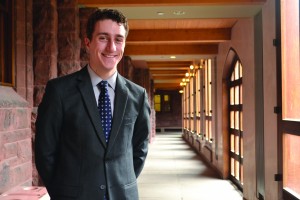
Schwarzman College at Beijing’s prestigious Tsinghua University on a fully funded scholarship.
The scholarship program, created by Blackstone co-founder Stephen A. Schwarzman, focuses on promoting a broader understanding of global issues among young leaders. Its advisory panel—including Tony Blair, Nicolas Sarkozy and Condoleeza Rice—and lecturers—Niall Ferguson, Lawrence Summers and Renée Fleming—reflect this focus on international leadership and accomplishment.
Rodenkirchen, who is from Kelowna, B.C., is most looking forward to the conversational exchange in such a diverse group, being a part of an “intellectual pressure cooker,” and engaging with the diversity of ambitions and experiences.
“At Trinity, so much of my education and my best memories have been the conversations around the dinner table. Similarly, at Schwarzman, I’m grateful for the perspective and long-term challenge of being a part of a community like this,” says Rodenkirchen.
“The issues that I’ve studied in international relations are collective-action problems. The links [established in this program with the other students] will allow us to cut through policy fog to help solve these collective problems. The nature of problems is more global, but the solutions can be personal.”
He will head to Beijing well-prepared to hold his own in a class of global leaders, with experience running The Salterrae and Undergraduate Journal of Political Science, and working in the financial and non-profit sectors as well as at Canada’s Department of Foreign Affairs in Vietnam.
Rodenkirchen, Flynn and Hawa all agree that one of the greatest aspects of their respective scholarships is the freedom afforded by having their graduate studies fully funded. “We’re granted a lot of intellectual freedom because funding is not an issue,” says Hawa.
“It does offer this opportunity to go in whatever direction you want,” says Flynn. “Today there’s such an expectation that you will pursue a course of study that is going to land you a job right after your undergraduate degree, but because this scholarship covers the cost of a degree, there is greater flexibility.”
Trinity’s Rhodes Scholars
Arthur Griffin, 1914
John Lowe, 1920
Escott Reid, 1927
William Smith, 1927
George Cartwright, 1930
C. Herbert Little, 1930
John Stewart, 1933
George Ignatieff, 1936
James George, 1940
William M. Cox, 1951
David M. Harley, 1952
Andrew M. Watson, 1952
Ronald Watts, 1952
Peter H. Russell, 1955
Stephen H.E. Clarkson, 1959
Timothy H.E. Reid, 1959
Arthur R.A. Scace, 1960
George D. Butterfield, 1961
Modris Eksteins, 1965
Derek P.H. Allen, 1969
Brian Morgan, 1972
John Allemang, 1974
John S. Floras, 1975
Christopher R. Honey, 1984
J. Elizabeth Elbourne, 1985
Kerry Stirton, 1985 (non-grad; former Junior Fellow)
John M. Caccia, 1988
Karl G. Hansen, 1988
Michael Szonyi, 1988
Jonathan E. Bays, 1990
Katherine A. Cochrane, 1990
Alexandra Binnie, 1997
Naana Jumah Non-grad; former St. Hilda’s resident (2001)
Thomas Ringer, 2003
Zinta Zommers, 2003
Maria Banda, 2004
Navindra Persaud, 2004 (non-grad; former Trinity Don)
Bryony Lau, 2005
Steven Wang, 2011
Connor Emdin, 2013
Caroline Leps, 2015
James Flynn, 2016
Kaleem Hawa, 2016
Family of Robertson Davies donates rare Book of Common Prayer
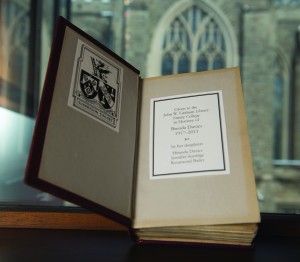 In December, Miranda Davies ’63 met with Nicholls Librarian and Director of the John W. Graham Library John Papadopoulos to donate a Book of Common Prayer to the Trinity library. The book, a rare 1706 edition, belonged to her father, Robertson Davies, who was a member of the Trinity faculty from 1960 to 1981. “We were honoured to receive this special edition,” says Papadopoulos. “Miranda was quite pleased with our good collection of her father’s books. She suggested that we buy A Celtic Temperament, which had just come out—it’s a selection from Robertson Davies’ diaries from 1959 to 1963. We did, of course.”
In December, Miranda Davies ’63 met with Nicholls Librarian and Director of the John W. Graham Library John Papadopoulos to donate a Book of Common Prayer to the Trinity library. The book, a rare 1706 edition, belonged to her father, Robertson Davies, who was a member of the Trinity faculty from 1960 to 1981. “We were honoured to receive this special edition,” says Papadopoulos. “Miranda was quite pleased with our good collection of her father’s books. She suggested that we buy A Celtic Temperament, which had just come out—it’s a selection from Robertson Davies’ diaries from 1959 to 1963. We did, of course.”
“The diaries show a very candid side of Davies,” says Papadopoulos with a laugh. “In one entry, dated November 6, 1959, he writes: ‘To Toronto to chat with Gordon Roper [chair of English at Trinity] and Provost Owen of Trinity College. It is now settled that I shall be visiting professor in 1960-61: am well pleased. Lunch at Trinity very bad.’”
FROM THE ARCHIVES
by Sylvia Lassam, Trinity’s Rolph-Bell Archivist
Note: What follows is an account of an event in Trinity’s history, a snapshot in time. We thought this might be of interest given the release in June 2015 of the findings and Calls to Action of the Truth and Reconciliation Commission of Canada, which have provided us with a more complete picture of our collective history as a nation.
The College has taken a number of steps to broaden awareness and discussion of Aboriginal history and relations in the wake of the legacy of Canada’s residential school system. “For more than 10 years we have included a module on First Nations and church relations,” says Trinity’s Dean of Divinity David Neelands. “We are now working to incorporate the findings of the Truth and Reconciliation Commission into not only Trinity’s curriculum, but also the curriculum of all theological colleges.” Adds Jonathan Lofft, Adjunct Instructor in the Faculty of Divinity, “Even clarifying basic vocabulary is important in helping to encourage open dialogue. These are difficult issues and as a university we can provide an environment to facilitate discussion, debate, and finding a way forward.”
In conjunction with Anglican organizations across Canada, the Divinity faculty intends to host a public reading of the UN Declaration on the Rights of Indigenous Peoples to mark National Aboriginal Day this June.
TRINITY COLLEGE CONFERENCE ON THE CANADIAN INDIAN: JANUARY 21 AND 22, 1966
Because a 50th anniversary is involved, I’m prompted to tell a remarkable story contained in a single box in the Trinity Archives. The box contains the records of the Trinity College Encounter Club, established in 1962 and active until 1967. The surviving records do not contain a constitution, or any mention of the aims of the club, but it appears to have been a forum for discussion on national and international issues, probably structured to foster “encounters” with other cultures. In 1963, the club organized a Conference on African Affairs held over two days, bringing together ambassadors from a number of African states, academics and a member of the U.S. State Department speaking to 250 students and staff. In 1965, club members began planning the “Conference on the Canadian Indian,” to be held January 21 and 22, 1966. One assumes that the general climate of the 1960s (the anti-war and the civil rights movements) contributed to the enthusiasm of Trinity students to delve into Aboriginal issues. The December 1964 issue of the Encounter, the club’s journal, contained an article by David Warner, “Another Cause,” that explored the issues and encouraged students to pressure various levels of government to help. The minute book reports, cryptically, that on March 8, 1965, “Mr. Bigman, Six-Nations Indian, spoke on Indian Affairs.”
On March 23, 1965, a meeting was held of parties interested in the conference and the basic structure was formed. Provost Owen was Honorary Chairman, C.A. Ashley was the honorary treasurer, Dean Gordon Watson and Father Ian Mackenzie formed the executive committee, and students signed up for various posts. Chris Tupker, president of the Encounter Club, was the Conference Co-ordinator. Mike Ignatieff signed up for Press. Patrons included Chancellor Berkinshaw, The Hon. James Gladstone of the Senate, and Dr. Gilbert Monture, a Mohawk from the Six Nations Reserve who was an Officer of the Order of the British Empire, army reservist, and world-renowned expert in mineral economics. The primary purpose of the conference was to inform students in the hope that this knowledge would lead to action to help respond to some of the problems facing Canada’s Indigenous peoples.
The conference program reads like that of any academic conference: addresses, seminar groups, panel discussions, entertainment, films and speakers. But look who they managed to bring in! Walter Currie was Conference Chairman. A non-status Indian, Currie was an elementary school principal at the time of the conference. He later became assistant superintendent with the Ontario Department of Education, with responsibility for northern and native schools; president of the Indian-Eskimo Association; first chairman of the Toronto Indian Friendship Centre; and chairman of Trent University’s Department of Native Studies. Basil Johnston, teacher, writer and ethnologist, led a panel that included Howard Staats, Trinity graduate and future lawyer; Fred Kelly, Grand Chief Emeritus of the Anishinaabe Nation in Treaty #3, activist, leader and residential school survivor; Elliott Moses, historian of the Six Nations Reserve; Al Borovoy of the Labour Human Rights Committee; and Dr. Daniel G. Hill of the Ontario Human Rights Committee.
The after-dinner entertainment that evening was provided by Chief Howard Sky, dancers from the Six Nations Reserve, and actor/poet Duke Redbird. Veteran of the Second World War and labour organizer Omer Peters joined Duke Redbird and Walter Currie on another panel. The Government of Canada was represented by R.F. Battle, Assistant Department Minister of the Department of Indian Affairs and Northern Affairs; and by Len Marchand, Special Assistant to the Minister. Jean Lagasse, Director of the Citizenship Branch, Department of Citizenship, gave the opening address. A number of Trinity students were on the coordinating committee and made it all happen. Harold Cardinal was invited and came; Buffy St. Marie, sadly, couldn’t make it.
Members of the Encounter Club raised $7,500 in donations to finance the conference. The main expenses were travel and accommodation, as the planning committee recognized that it was important to have strong participation by Indigenous people from across the country. Expenses were paid from the donations and conference fees; government departments that sent speakers paid their own way. Conference organizers found that there were approximately 75 Indigenous students enrolled in Canadian universities. Twenty were invited, and some 60 other Aboriginal Canadians participated, along with about 250 non-Aboriginal university students.
Prime Minister Pearson was invited to address the closing banquet. He wrote personally to Provost Owen to express his regret that he was unable to attend due to a scheduling conflict.
The Conference Evaluation Summary submitted by Alastair Sweeny, Recording Secretary, concluded that it was a great success—something that he attributed in large part to the Indigenous participation. The Conference received a great of attention in the press; all the major papers, the Varsity, and a number of local papers reported on the divergent views of the panelists.
According to Ian Mackenzie, the conference “began a process of supporting or making a base for native people to be put in a position where they were teaching rather than the recipient.” Within a few years of the conference he helped implement the 1969 Hendry Report, which sought to bring together the Anglican Church and traditional healers. Trinity alumnus Don Smith, writing about the conference in 1999, recalled that the conference profoundly affected him, planting the seed for a 30-year study of the history of Aboriginal Canada.
As far as we know, the Trinity College Conference on the Canadian Indian was the first student-organized conference in Canada to deal with First Nations issues. In the spirit of learning, Trinity students raised awareness and raised money, gathered Indigenous and non-Indigenous people from around the country, and put them together to listen and learn from each other. Don Smith said to me, and I believe he’s right, “This is a huge story that deserves to be told.”

Sorry, comments are closed for this post.